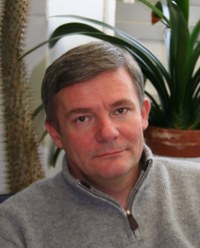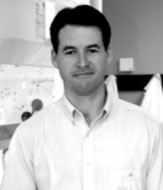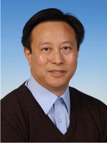Visiting professorships in 2015
The Liebig-College invites every year visiting research professor, who give top-caliber lectures and seminars complementary to the themes of the JLU research groups. In 2015 our visiting research professors were:
Prof. Andrey A. Fokin (Kyiv Polytechnic Institute) |
|
 |
Professor Fokin specializes in preparative and theoretical aspects of hydrocarbon chemistry, alkane activation mechanisms, generations and transformations of hydrocarbon radical cations, computational chemistry of radicals and radical ions, elemento-organic chemistry. His current research interests are focused on chemistry of diamondoids and related structure. Professor Fokin was our Liebig-Lecturer from 01.10 - 30.10. |
|
|
|
Prof. R. Morris Bullock (Pacific Northwest National Laboratory - Washington) |
|
 |
Professor Bullock is working at the Center for Molecular Electrocatalysis, an Energy Frontier Research Center funded by the U.S. Department of Energy. The focus of their research is design and development of molecular electrocatalysts for conversions between electrical energy and chemical energy (chemical bonds in fuels). Their objective is to understand, predict, and control the intramolecular and intermolecular flow of protons in electrocatalytic multi-proton, multi-electron processes including the production of H2, the oxidation of H2, the reduction of O2, and the reduction of N2. Professor Bullock was our guest from 31.05 - 15.06. |
Prof. Peter Gill (Australian National University, Canberra) |
|
|
Professor Gill is specialized in theoretical and computational chemistry. Furthermore he is interested in atomic, molecular, nuclear, particle and plasma physics. He was a visiting Professor at June 10th. |
|
Dr. Stephen Thomas |
|
 |
Work in the Thomas group focuses on the development of new catalytic methodologies for organic synthesis using non-toxic, environmentally benign and inexpensive reagents and catalysts. Ultimately, we aim to provide the non-expert with operationally simple methods for the construction of complex molecular frameworks. Underpinning this is a keen interest in physical organic chemistry and organometallic mechanism to understand and probe the fundamental reactivity and interactions of our developed methods. Dr. Thomas was our Liebig-Lecturer from 13.08 - 28.08. |
Prof. Craig M. Williams (University of Queensland, Brisbane) |
|
 |
Professor Williams is an organic chemist with a research focus and expertise orientated around constructing and attempting to construct very complex biologically active natural products and drug like molecules. These projects have instilled highlevel chemical competency within his group, which allow the team to tackle both simple and complex problems in associated areas such as medicinal and physical organic chemistry. Targets and areas of expertise cover diterpenes, diterpene alkaloids, alkaloids/opioids, tetranortriterpenes, polyketides, polycyclic hydrocarbons, saturated and unsaturated nitrogen, oxygen and sulfur containing heterocycles. During the course of Williams’ research program new synthetic methodologies are discovered and developed and to-date many of these have been organometallics and photochemical based. His group also undertakes isolation and elucidation of natural products in collaboration with industry, Some of our findings we have reported to-date include work on Croton insularis, which grows in the Australian rainforest. Professor Williams was visiting professor from 07.09 - 18.09. |
Prof. Yun-Dong Wu (Peking University Shenzhen Graduate School, Shenzhen) |
|
 |
Professor Wu as a theoretical organic chemist is focussing on 1) Reaction mechanism and stereochemistry, 2) Development of accurate protein force fields for protein simulations, 3) Drug design based on protein-protein interactions. Professor Wu was our guest at May 7th. |

